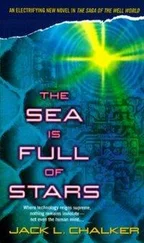Jack Chalker - Priam's Lens
Здесь есть возможность читать онлайн «Jack Chalker - Priam's Lens» весь текст электронной книги совершенно бесплатно (целиком полную версию без сокращений). В некоторых случаях можно слушать аудио, скачать через торрент в формате fb2 и присутствует краткое содержание. Год выпуска: 1999, ISBN: 1999, Издательство: Del Rey / Ballantine, Жанр: Фантастика и фэнтези, на английском языке. Описание произведения, (предисловие) а так же отзывы посетителей доступны на портале библиотеки ЛибКат.
- Название:Priam's Lens
- Автор:
- Издательство:Del Rey / Ballantine
- Жанр:
- Год:1999
- ISBN:0-345-40294-4
- Рейтинг книги:3 / 5. Голосов: 1
-
Избранное:Добавить в избранное
- Отзывы:
-
Ваша оценка:
- 60
- 1
- 2
- 3
- 4
- 5
Priam's Lens: краткое содержание, описание и аннотация
Предлагаем к чтению аннотацию, описание, краткое содержание или предисловие (зависит от того, что написал сам автор книги «Priam's Lens»). Если вы не нашли необходимую информацию о книге — напишите в комментариях, мы постараемся отыскать её.
Priam's Lens — читать онлайн бесплатно полную книгу (весь текст) целиком
Ниже представлен текст книги, разбитый по страницам. Система сохранения места последней прочитанной страницы, позволяет с удобством читать онлайн бесплатно книгу «Priam's Lens», без необходимости каждый раз заново искать на чём Вы остановились. Поставьте закладку, и сможете в любой момент перейти на страницу, на которой закончили чтение.
Интервал:
Закладка:
“Clever, though,” Colonel N’Gana commented.
On the screen, in three dimensions, color, and with full and authentic depth, sitting in the middle of empty space but somehow internally and fully illuminated, was a gigantic sailing ship out of Earth’s past.
“What is actually there. Captain?” Takamura asked, fascinated. “I assume this is inherent in the scanning operation, so that the effect is a broadcast that overwhelms the screen. It is a clever invention, but it shouldn’t fool your own instruments.”
“Computer?” the captain prompted.
“Orion class frigate, well armed, showing its age but well maintained and upgraded. Minimum life signs aboard,” the computer reported.
“Orion class! That is an antique!” Admiral Krill commented. “It has to be salvaged from one or more vessels that went down in the initial Titan attacks. Nothing else makes sense.”
“Nonetheless, it makes a formidable pirate ship for freighters like us, does it not?” the captain responded. “Computer—you say minimal life signs aboard. How many biological life-forms do you scan?”
“There is some jamming of this. My sensors indicate very few, though. Perhaps as few as one.”
“One!” Takamura gasped. “Could one person even fly a ship like that?”
“Easily,” Admiral Krill told her. “That is, if they knew what they were doing in the first place, and they obviously do. Just like this ship, it’s all computerized, much of it artificial intelligence piloting and navigational gear. The crew of a modern frigate is small, and much of it is assigned to the sim training facilities and interpretive intelligence sections. The majority of live people aboard today’s frigates are Marines in combat gear.”
“Well, dear, don’t let’s keep guessing,” the old diva prodded the captain. “Hail them and let’s get going!”
“Odysseus to Flying Dutchman. Here we are. Please inform us as to what this is about.”
For a short period there was no response. Then back came a voice that was full, firm, and almost kindly, with just a trace of accent that could not be placed. “This is Hendrik van Staaten, captain of the Hollander. Your ship has transmitted the correct coding, and I have acknowledged it. We are both who we say we are and we are out here in the middle of nowhere. Shall we begin our negotiation?”
Madame Sotoropolis whispered to her captain, “Any chance of visuals?”
The captain shook his head. “No, ma’am. He’s got that blocked.”
“Hell of a trip and lots of trouble for a phone call,” Stavros retorted. “We’re all gathered here. Would you like a rundown of the assemblage?”
“Unnecessary,” van Staaten replied. “I probably know more about your passengers right now than you do. Overall, the choices run from good to adequate, but even the question marks will have to do. Let us begin by doing a bit of background work. Colonel N’Gana, have you ever heard of Priam’s Lens?”
The colonel snorted. “It was a pipe dream from a century or more back,” he responded. “Some sort of gizmo attached to a natural phenomenon nobody understood that was supposed to actually be capable of drilling a hole right through a Titan. Quite the adventure thriller concept, but there was no basis for it. Only in fiction do people just conjure up superweapons. In any event, it didn’t work.”
“The Lens, which is a natural phenomenon, does exist. The theory behind using its curious by-products as a weapon was sound, and a prototype was built that worked in limited tests,” van Staaten told them. “Madame Sotoropolis, I suspect, knows of the project. It was financed partly by Karas family money when the government took your own position, Colonel.”
Eyes turned to the old lady in the veil and sacklike dress.
“It was a last chance to save our world,” she said softly, remembering over the years. “Nobody else had any kind of answer at all. The Confederacy’s research and development people, its military, all the rest, had gone off on their own secret weapons projects that produced a lot of busy-work and lots of pet theories, but none of them worked. Eventually, they stopped funding them. We—the family, that is—did our own searching and researching when it became clear that we were in the way of this new threat. Almost everything we found had been tried by one or another of the government projects. So, we looked at the ones they rejected as too silly, too impractical, or simply fantasy. We found several, almost all very odd ideas from highly eccentric university types who were considered crackpots. All were highly eccentric—that is, crazy as loons—and most were crackpots, but some were not. The one involving the curious effects produced by Priam’s Lens, which was close to our system and in fact was the reason Helena had been discovered, showed definite promise, but before a full working prototype could be built and deployed, Helena was overrun. We never knew what happened to that or several other projects. We assumed that they either ran when the funding ran out or the world was overrun, or they were down there at the time.”
“I am most curious,” Doctor Takamura put in. “What sort of thing was this Priam Lens? Some sort of death ray? It certainly sounds like one of those cheap thriller ideas.”
“Some sort of thing in space. I really don’t know,” the diva told her. “I sang. My great-great-grandson and my two great-great-great-granddaughters were into all that. They’re all gone now.”
“On Helena?”
“No, not all of them. A different story for a different time, perhaps. But I knew little of this save that the projects were going on.”
“You did, however, recognize Priam’s Lens by name when I mentioned it,” van Staaten noted. “And I am certain that you are not here with these people on a whim. You have checked out the partial data I sent you. You know it is true. You know that I may be able to give you the location of the prototype of the Priam’s Lens project codes.”
“You also claim to be able to get in and out of Titan-controlled worlds. I assume that is on the polar sweep worlds?” N’Gana put in.
“Yes, that is true. The sweep worlds are the ones. Fortunately, Helena is such a world. It does, however, present particular problems, since the gravitational effects of the two moons in opposition orbits keeps the ocean very churned up and very dangerous at many times during the year. It is not an easy body to navigate under the best of conditions.”
“That is true,” Father Chicanis acknowledged. “We found working underwater to be far preferable to surface work, although it is possible to sail them if you are good enough and have a good enough craft.”
“Ah, yes. Father Chicanis. Good of you to be along. Understand, though, that you cannot work submerged under today’s conditions. While the overall force fields that drain all power from anything we can build tend to lose some effect just below two meters, that does not mean they have no effect. And if power is applied, rather than simply idled, it sets off alarm bells and you’re dead. That’s why even the underground and underwater installations went. That leaves you with non-powered surface travel as the only way. You cannot land on the continents or within the continental shelf’s limits. Those are constantly under monitoring and observation by the Titan grid. Non-powered craft, however, generally escape detection if at sea. The wave action and tidal forces appear to foul up their precise locators. But my people can get in. They do get in, and out, and quite often, if there’s something there we really think is worth the risk. The price is pretty high if they fail, though.”
“Priam’s Lens, or at least the prototype, is, I gather, on Helena? Probably on Atlantis?” Chicanis guessed.
Читать дальшеИнтервал:
Закладка:
Похожие книги на «Priam's Lens»
Представляем Вашему вниманию похожие книги на «Priam's Lens» списком для выбора. Мы отобрали схожую по названию и смыслу литературу в надежде предоставить читателям больше вариантов отыскать новые, интересные, ещё непрочитанные произведения.
Обсуждение, отзывы о книге «Priam's Lens» и просто собственные мнения читателей. Оставьте ваши комментарии, напишите, что Вы думаете о произведении, его смысле или главных героях. Укажите что конкретно понравилось, а что нет, и почему Вы так считаете.












